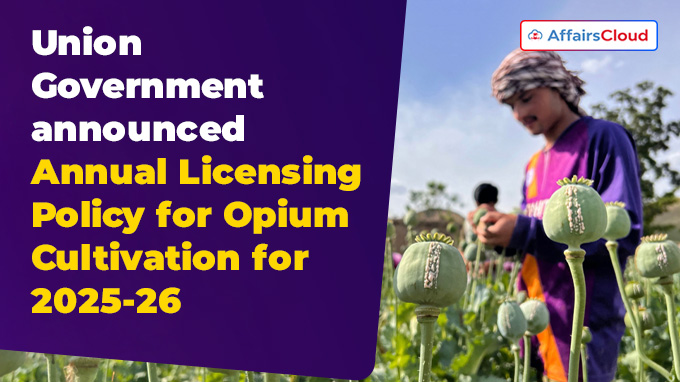 In September 2025, the Government of India(GoI) Ministry of Finance (MoF) announced the annual licensing policy for crop year 2025-26 during the Opium Crop Year from 1st October, 2025 to 30th September, 2026, of license for cultivation of opium poppy.
In September 2025, the Government of India(GoI) Ministry of Finance (MoF) announced the annual licensing policy for crop year 2025-26 during the Opium Crop Year from 1st October, 2025 to 30th September, 2026, of license for cultivation of opium poppy.
- This policy covers the farmers in the states of Madhya Pradesh (MP), Rajasthan and Uttar Pradesh (UP).
Exam Hints:
- What? Opium Poppy license policy
- States covered: MP, Rajasthan, UP
- Farmers eligible: 1.21 lakh
- Existing Eligibility: 4.2kg/ha
- New Eligibility: 3 kg/ha – 4.2 kg/ha
Key Highlights:
About Opium: Opium poppy plant is the source of opium gum which contains several indispensable alkaloids (naturally occurring organic nitrogen-containing compounds) such as morphine, codeine and thebaine.
- Morphine is commonly used analgesic (pain relieving medicine) while codeine is used in manufacture of cough syrups.
- India is the only country authorised by the United Nations (UN) Single Convention on Narcotic Drugs (1961) to produce gum opium.
Objectives: The policy aims to balance the country’s medical and palliative care needs with a vision of “Atmanirbharta” (self-reliance) in the production of alkaloids.
- It also introduces several key changes to incentivize high-performing farmers and modernize the sector.
Expansion: The new policy is set to significantly expand cultivation by making an estimated 1.21 lakh farmers eligible for licenses, a 23.5% increase over the previous year.
- This includes the addition of approximately 15,000 new farmers to benefit from opium cultivation.
Eligibility: Existing cultivators who achieved a high morphine yield (MQY-M) of 4.2 kg per hectare (ha) or above are eligible for continued licenses.
- Existing opium gum cultivators with morphine yields between 3.0 kg and 4.2 kg per ha are now eligible to cultivate unlanced poppy straw under the Concentrate of Poppy Straw (CPS) method, with a five-year license validity.
Digitisation: The digitization of cultivators’ data since 1995-96 has enhanced inclusivity, enabling marginal farmers from past years to access licenses by meeting the prescribed eligibility and relaxed criteria.
Incentives: High-performing farmers, who have achieved yields of 900 kg/ha and above of unlanced poppy straw will be given an option to switch to the traditional method of opium gum cultivation.
Suspension: The GoI will suspend licenses for the crop year 2025-26 for farmers under CPS cultivation who failed to meet the prescribed MQY of 800 kg/ha during the previous crop year (2024-25).
WHO Certification: The alkaloid factory at Neemuch in MP has achieved WHO (World Health Organization) Good Manufacturing Practice (GMP) certification this year.
Note:
Palliative care: It is a specialized medical care that provides symptom relief and support to people living with serious illnesses, with the goal of improving quality of life for both the patient and their family.
- Morphine and other opioid medicines derived from opium poppy are essential in palliative care for pain relief, breathlessness, and overall comfort at the end of life.




